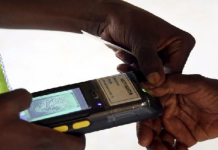DEVELOPING NIGERIA’S DIGITAL ECONOMY: THE JOURNEY SO FAR
Being a Speech Presented By the Chief Host, Dr Isa Ali Ibrahim (Pantami), FNCS, FBCS, FIIM, Honourable Minister
Federal Ministry of Communications and Digital Economyat the Digital Nigeria Day and the United Nation’s World Development Information DayCelebrationonSaturday, 24th October 2020
All Protocols duly observed.
May Peace, Mercy and Blessings be upon you!
I am very delighted to deliver this speech as we mark the maiden edition of our Digital Nigeria Day. Today makes it exactly one year since we commenced the implementation of a Policy for the development of a Digital Economy in Nigeria. I will use this opportunity to discuss the importance of a digital economy and our journey so far.
Today also marks the day declared by the United Nations as the World Development Information Day. The United Nations Resolution A/RES/65/141 announced this date and noted that “Information and communications technologies have the potential to provide new solutions to development challenges, particularly in the context of globalization, and can foster economic growth, competitiveness, access to information and knowledge, poverty eradication and social inclusion.”
Importance of the Digital Economy
The digital economy has been defined in various ways by different institutions. However, it is noteworthy that these definitions tend to centrearound the utilization of digitized information and knowledge as key inputs to the economy. For simplicity, we defined a digital economy as any aspect of the economy that is based on or driven by digital technologies. Digital economies are recognized as the single most important drivers of innovation, competitiveness and growth for any economy.
The global digital economy makes up a significant proportion of the global economy. A report by Oxford Economics, valued the digital economy at $11.5 trillion as at 2016, or approximately 16% of the value of the global economy with the digital economy growing 2.5 times faster than global GDP over the past 15 years.
According to McKinsey, the digital economy in Africa is expected to grow to over $300 billion by 2025. The World Economic Forum also predicts that over 60% of global GDP will be digitized by 2022 and that within the next decade, digital platforms will be used to create close to 70% of new value. We are also witnesses to how the COVID-19 pandemic has greatly increased the adoption of digital technologies. All these show the great value of the digital economy and serve as an incentive for countries to prioritize its development.
The Digital Economy has also proven to be a veritable platform for the creation of jobs. For example, in 2017 alone, the digital economy contributed 5.1 million jobs to the economy of the United States. An official report in China also noted that digital economy created 191 million jobs in the country in 2018 and this was about 25% of the total employment generated that year. Furthermore, the recent changes in work patterns as a result of the COVID-19 pandemic have also shown that the development of digital economies are no longer a luxury, rather they have become a necessity.
Nigeria’s Digital Economy Journey
Bearing in mind the importance of a digital economy, His Excellency, President MuhammaduBuhari, GCFR, approved our request to redesignate the Federal Ministry of Communications as the Federal Ministry of Communications and Digital Economy on the 17th of October, 2019. The change was officially endorsed at the Federal Executive Council on the 23rd of October, 2019 and the process of implementing a digital economy for the country began on the 24th of October, 2019, which was approved as the Digital Nigeria Day.
The redesignated Ministry also had an added mandate of developing the digital economy in line with the focus of the Federal Government and the first step was the development of a Policy and Strategy to drive the development of the Digital Economy.
The redesignation reflects the focus of Mr President to lay emphasis on the need to build a digital economy, addressing the new mandate of the Ministry; communications addressing the channel, digital addressing the nature of the content and economy reflects the central focus of the activities of the Ministry, which is the development of the economy in line with the policies of the Federal Government.
National Digital Economy Policy and Strategy (2020 – 2030)
We developed a National Digital Economy Policy and Strategy (NDEPS) for a Digital Nigeria. It was unveiled and launched by President MuhammaduBuhari, GCFR, on the 28th of November, 2019. NDEPS provides a holistic and sustainable approach towards the development of our nation’s digital economy. It is based on the following 8 pillars:
- Developmental Regulation;
- Digital Literacy and Skills;
- Solid Infrastructure;
- Service Infrastructure;
- Digital Services Development and Promotion;
- Soft Infrastructure;
- Digital Society and Emerging Technologies; and
- Indigenous Content Development and Adoption.
These pillars outline our approach for the development of the digital economy.
Achievements in the Implementation of NDEPS
Pillar #1: Developmental Regulation
The Developmental Regulation pillar focusses on the provision of support for the effective regulation of the digital technology sector in a way that fosters, rather than stifles, development. Many Policy and regulatory instruments have been developed, as part of activities of the developmental regulation pillar, to address some of the prolonged concerns in the ICT sector to support the development of the Digital Economy. Some of these policies include:
- National Digital Economy Policy & Strategy 2020-2030;
- Roadmap for the Implementation of the NDEPS;
iii. Nigerian National Broadband Plan 2020-2025;
- SIM Card Registration Policy;
- National Policy for the Promotion of Indigenous Content in the Telecommunications Sector (Draft);
- National Policy on Digital Innovation and Entrepreneurship. (Draft)
vii. National Policy on Virtual Engagements in Federal Public Institutions;
viii. Nigeria Digital Asset Management Policy (Draft); and
- National Dig-Once Policy (Draft).
Pillar #2: Digital Literacy and Skills
The digital literacy and skills pillar recognises the fact that citizens are the greatest assets in any economy, including the digital economy. It supports the development of a large pool of digitally literate and digitally skilled citizens.
We recently provided online learning platforms to enable Nigerians receive training in diverse digital skills. Such platforms include the DigitalNigeria.gov.ng platform and NITDA Academy for Research and Training. Over 114,000 Nigerians have enrolled on these platforms, including about 67,000 enrolees since we officially launched the Digital Nigeria portal on the 28th of September, 2020.
As part of activities in this pillar, parastatals under the Ministry have implemented programmes like:
- Tertiary Institution Knowledge Centres
- E-AccessibilityCentres
iii. E-learningCentres
- Digital Capacity Training Centres
- IT Hubs
- IT Innovation and Incubation Centres
vii. School Knowledge Centres
viii. etc
We are also championing a paradigm shift that lays emphasis on skills, in preference to merely having degrees without skills. Degrees are only meant to validate skills. This is a growing trend across the globe. China recently began a process of transforming 600 of the country’s general universities into skill centres. Also, the President of the United States of America signed an Executive Order on the 26th of June 2020 directing the federal government lay emphasis on skills rather than degrees when hiring staff.
Pillar #3: Solid Infrastructure Pillar
The Solid Infrastructure pillar addresses the need to provide broadband access and data centres required to enable citizens to access the digital solutions that characterize the digital economy. When I assumed office on the 21st of August 2019, the official broadband penetration figures stood at 33.72%. It increased with the subsequent monthly figures from end of August 2019 to end of August 2020, where it stood at 43.3%.
Broadband is a key component of any digital economy and it is not merely for entertainment. Rather, empirical evidence has shown that it can help to significantly improve economic indices, create jobs and lift people out of extreme poverty. For example, according to a Report by Ericsson titled “How Important Are Mobile Broadband Networks for Global Economic Development”, 10% increase in mobile broadband penetration results in approximately 0.6% to 2.8% rise in gross domestic product (GDP).
A Nigerian National Broadband Plan (2020- 2025) was developed to accelerate the growth of broadband connectivity across the country. The Plan was unveiled and launched by Mr President on the 19th of March, 2020.
The Plan is designed to deliver data download speeds across Nigeria of a minimum 25Mbps in urban areas, and 10Mbps in rural areas, with effective coverage available to at least 90% of the population by 2025 at a price not more than N390 per 1GB of data (2% of median income or 1% of minimum wage).
Mr President also approved the designation and protection of relevant telecommunications infrastructure across the country as Critical National Infrastructure (CNI) and this supports the implementation of the Plan. In addition to these, we have addressed the Right of Way Issue (RoW) that had lingered for over a decade. Many State Governors have now approved the RoW charges of N145 per metre and some have even cancelled the fee all together.
Examples of amounts charged per linear metre in the past include N4,500 and N5,500, some states even charged about N16,000! To give a better illustration, for a particular State, the estimated cost of connecting two Local Government Areas ran into hundreds of millions of Naira before the implementation of the RoW resolution but it now costs just N150,000!
Pillar #4: Service Infrastructure Pillar
The service infrastructure pillar addresses the provision of robust digital platforms to drive the digital economy. These platforms enable transactions and interactions online. They also have the added advantage of enabling a supply of data from which both government and the private sector can gain useful insights with which to develop the digital economy.
Digital platforms enable us digitize business processes and this can lead to significant savings. As part of the activities of this pillar, we launched the Virtual Federal Executive Council (FEC) meetings and this was unprecedented. The National Policy on Virtual Engagements in the Federal Public Institutions which we developed supports the activities of this pillar.
We have also developed an IT clearance portal to support inoperability, eliminate duplication and ensure value for money in the implementation of ICT projects in the country. The IT Projects Clearance programme has saved over N5 billion for the Federal Government.
Pillar #5: Digital Services Development and Promotion
The Digital Services Development and Promotion pillar focuses on driving growth in the number of digital jobs and digital entrepreneurs in the country. With an average age of just over 18 years, Nigeria has a potential critical mass of ‘digital natives’ that can transform the country into a regional and global digital powerhouse. These creative Nigerians can play a key role in the creation of digital jobs across all sectors of the country; jobs that are either based on or are dependent upon ICTs.
The pillar focuses on the fact that Small and Medium Enterprises (SMEs) can benefit from the digital economy because it provides important opportunities for scaling up and reducing costs. It also enables the creation of new business models that can challenge existing ones. All SMEs stand to benefit from the digital economy, whether they are new firms that start out as digital companies or older SMEs that are looking to integrate digital technology into their operations.
NDEPS appreciates the importance of identifying and supporting SMEs and it also focusses on encouraging many of these SMEs to go a step further by aiming to become Innovation Driven Enterprises (IDEs). The IDE-concept has been promoted by leading institutions such as the Massachusetts Institute of Technology (MIT) and these enterprises, no doubt, have great advantages. In contrasting IDEs and MSMEs we find that IDEs tend to have a global outlook while SMEs tend to start small and choose to remain local.
IDEs also generally require more capital than SMEs and tend to integrate innovation more into their activities more than SMEs. However, they can have a far more significant impact on the economy than the SMEs can. To further illustrate this, imagine the Massachusetts Institute of Technology as a nation of IDEs.
A 2015 Report notes that such an ‘MIT-nation’ would have been the world’s 10th largest economy, with gross revenue falling between the GDP of Russia ($2.097 trillion) and India ($1.877 trillion)! I currently lead an Abuja Massachusetts Institute of Technology Reaching Out Entrepreneurship Acceleration Program (MIT-REAP) to accelerate the development of home grown IDEs in Nigeria.
Pillar #5 aims to take Nigeria’s extensive MSME structure into account, integrating innovation in order to create a number of digital-driven SMEs as a bridge to creating a pool of IDEs to accelerate the development of Nigeria’s digital economy.
Many programmes are being implemented as part of the activities of Pillar #5. One of such programmes is the National Adopted Village for Smart Agriculture (NAVSA); it is part of the implementation of NDEPS for the agricultural sector. In order to keep up with the demands of the digital age, Agriculture has to be practised as a business and be driven by digital technologies. Innovation is more important in modern agriculture than ever before. The potential benefits of digitalizing the agrifood sector are convincing but it will require major transformation of farming systems, rural economies, communities and natural resource management.
Attaining this vision requires the integration of digital technologies and innovations into all sectors of the economy, while putting the country’s peculiarities into consideration. It is also a task that requires strategic planning and strong-transformational leadership to execute.
NAVSA was built as a digital platform to connect the agriculture ecosystem to deliver services to farmers in a more productive and efficient manner, in the interest of our nurturing digital economy for a digital Nigeria.
A digitalized agricultural sector holds great potential for wealth generation, job creation and for attracting foreign exchange into the country. For example, the Netherlands is a small nation with a population of just about 17 million people and an area of 42,000 square kilometers, not even up to twice the size of Jigawa State. However, in 2017, their agricultural exports were valued at 92billion EUR (approximately $104billion based on today’s conversion rate). Compare this to about $16billion we made in Nigeria from oil exports. Netherlands agricultural approach is smart and makes significant use of digital technologies. We want to do this in Nigeria and NAVSA is an important step in that process.
We have also actively built our innovation ecosystem and supported hubs and startups across the country. NITDA has also been directed to come up with the Nigeria Innovation and Entrepreneurship Policy.
Pillar #6: Soft Infrastructure
With the transition to digital platforms, it is crucial that we ensure privacy and the safety of online transitions. This is the focus of Soft Infrastructure pillar. We are partnering with the Office of the National Security Adviser and other institutions to ensure that our cyberspace is more secure. Privacy concerns are also being addressed through the Nigeria Data Protection Regulation (NDPR) 2019 and the Guidelines for the Management of Personal Data by Public Institutions 2020. The Guidelines were released bearing in mind the need to use personal data to mitigate the effects of the COVID-19 pandemic in particular and other situations where the need arises.
The NDPR performance report showed a lot of success stories, including the creation of 2,686 direct job roles, creating massive opportunities for young Nigerians to be recruited as Data Protection Officers, Data Protection Compliance Organizations, Compliance officers among others. The DPCOs have also earned over two billion naira in the first year of implementation.
Pillar #6 also addresses the issue of National Identity which is crucial to the development of the digital economy. The recent presidential directive for the National Identity Management Commission (NIMC) to be moved to the Ministry is part of government’s efforts towards accelerating the implementation of NDEPS. Digital ID is one of the key ingredients of the Digital Economy. I directed NIMC to increase enrollment by a minimum of 500%. Citizens are encouraged to get their Digital ID before end of this year. It could soon become mandatory for all citizens to access government services.
We are putting finishing touches to the Nigeria Digital Asset Management Policy to be released soon.
Pillar #7: Digital Society and Emerging Technologies
The Digital Society and Emerging Technologies pillar will ensure that the gains of the digital economy are mapped to indices of well-being in the lives of ordinary citizens. It is worthy of note that there has been a significant increase in the contribution of ICT to the GDP. Based on the Q2 2020 GDP Report by the National Bureau of Statistics, ICT contributed an unprecedented 17.83% to the GDP.
The effect of the digital economy is far greater than the ICT contribution shows. The Digital Economy encompasses ICT and all Digital Services, which includes all online activities in financial institutions, ecommerce, online tax payment, any form of online payment, online banking, etc. When we consider these, the contribution of the Digital Economy could be up to 45% or even more.
Emerging technologies are playing a defining role in how we disrupt across different industries. Some of these technologies include Internet of Things (IoT), Virtual Reality (VR), Artificial Intelligence (AI), Big Data Analytics, Robotics, autonomous (driving) vehicles and 3D printing.
For example, artificial intelligence is being widely used to spot disease outbreaks and issue location-specific alerts. 3D printing techniques are currently being used in the building industry. In 2016, it was used to build a 640 square metre, 2-storey building in Dubai. The process took 17days, with studies showing that it cut the building time by 50-70% and the labour costs by 50-80%.
We are supporting our startups to embrace emerging technologies and we already have some success stories. One example was when I led the Nigerian delegation, on behalf of Mr. President, to the 2019 Gulf Information Technology Exhibition (GITEX) that took place in Dubai, United Arab Emirates. At that event, a Nigerian tech solution (Chiniki Guard) beat 750 other startups from 73 countries and went on to win the overall best Startup in the Artificial Intelligence category and was given an award of $10,000. Chiniki Guard is a Nigerian Artificial Intelligence based security solution for retail stores and supermarkets to monitor, detect, and alert shop owners of shoplifting and suspicious behaviour in real time.
Pillar #8: Indigenous Content Development and Adoption
There is an urgent need to promote the development of indigenous content in every sector of the economy and the Indigenous Content Development and Adoption pillar is addressing this for the digital economy. This pillar aligns with Executive Orders 003 of May 2017 and 005 of February 2018, on “Support for Local Content Procurements by Ministries, Department and Agencies of the Federal Government of Nigeria” and the “Planning and Execution of Projects, Promotion of Nigerian Content in Contracts and Science, Engineering and Technology” respectively. It also gives a policy backing to Mr President’s admonition to Nigerians to “grow what we eat and consume what we produce”.
As part of our efforts to promote indigenous content, we have developed a policy for promoting indigenous content in the telecom sector to complement similar efforts that focus on the information technology sector. This is important to stem the tide of capital flight, amongst other things. A Report of the Association of Telecommunication Companies of Nigeria (ATCON) suggests that such capital flight in the telecom sector is as high as $2.16 billion annually. A healthy digital economy requires a robust indigenous content policy to significantly reduce this.
Conclusion
This is our first Digital Nigeria Day celebration and we are proud of the giant strides we have taken. I wish to thank His Excellency, President Muhammadu Buhari for his unwavering support, this has had an immense impact on the success we have achieved.
I wish to commend the CEOs of all the parastatals under the purview of the Ministry for your focus and commitment to the execution of your mandate. To the stakeholders, I also thank you for your support and for your willingness to provide constructive feedback. To the members of the fourth estate of the realm, we thank you for publicizing our activities and we continue to urge you to support us by accurately capturing what we say.
We believe that the progress we have made is just the starting point and we reiterate our commitment to redoubling our efforts as we develop the National Digital Economy for a Digital Nigeria. I thank you for your kind attention. Happy Digital Nigeria Day everyone!



















